Importance of Learning and Development in Organisation
VerifiedAdded on 2022/12/23
|11
|2899
|50
AI Summary
This report focuses on the importance of learning and development in organizations and how it contributes to growth and development. It discusses different theories and concepts implemented in organizations and how learning helps in achieving goals and objectives effectively. It also highlights the role of learning and development programs in employee satisfaction, turnover reduction, and maximizing productivity and profits. The report concludes with an overview of various learning development theories.
Contribute Materials
Your contribution can guide someone’s learning journey. Share your
documents today.

BUSINESS
Secure Best Marks with AI Grader
Need help grading? Try our AI Grader for instant feedback on your assignments.
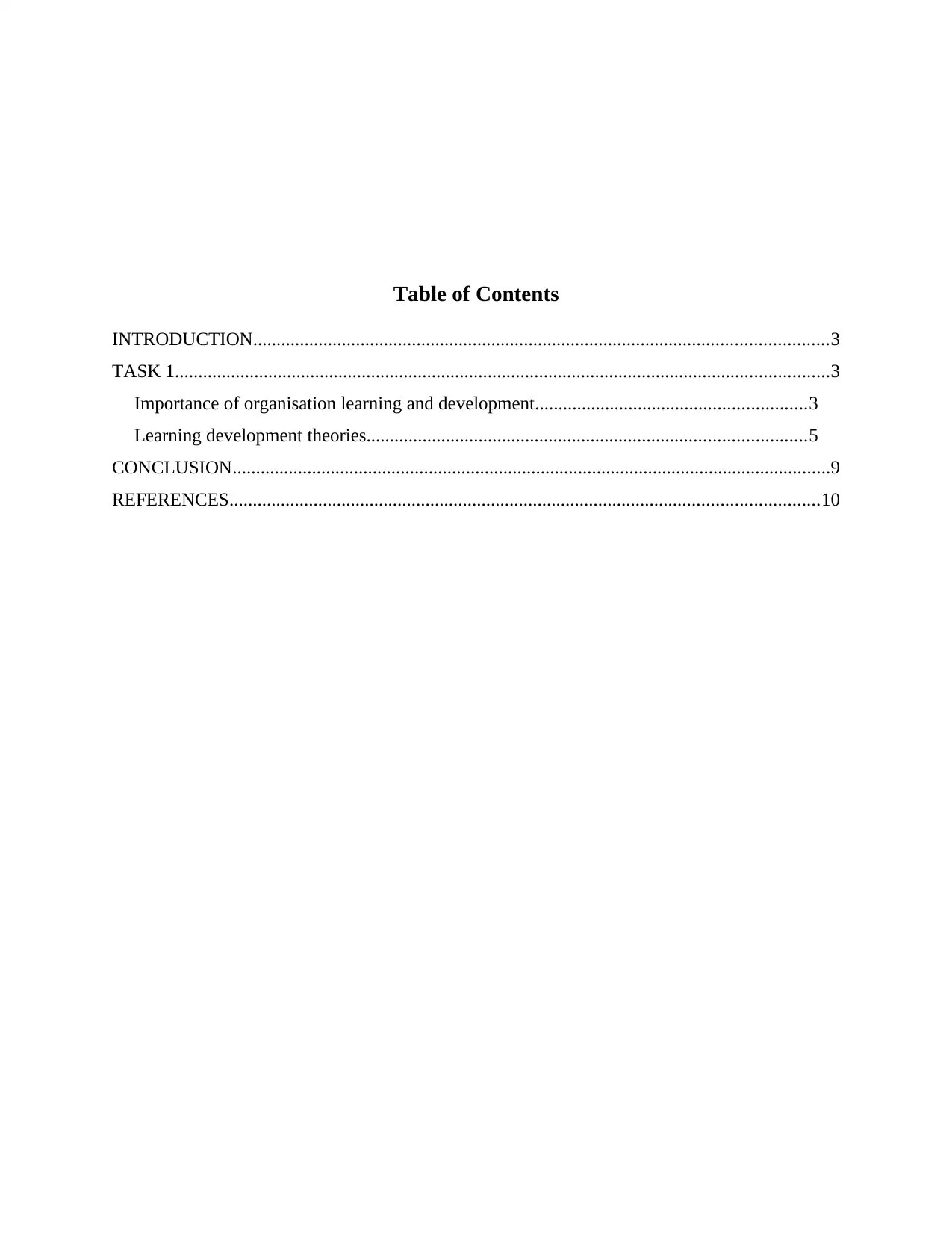
Table of Contents
INTRODUCTION...........................................................................................................................3
TASK 1............................................................................................................................................3
Importance of organisation learning and development..........................................................3
Learning development theories..............................................................................................5
CONCLUSION................................................................................................................................9
REFERENCES..............................................................................................................................10
INTRODUCTION...........................................................................................................................3
TASK 1............................................................................................................................................3
Importance of organisation learning and development..........................................................3
Learning development theories..............................................................................................5
CONCLUSION................................................................................................................................9
REFERENCES..............................................................................................................................10
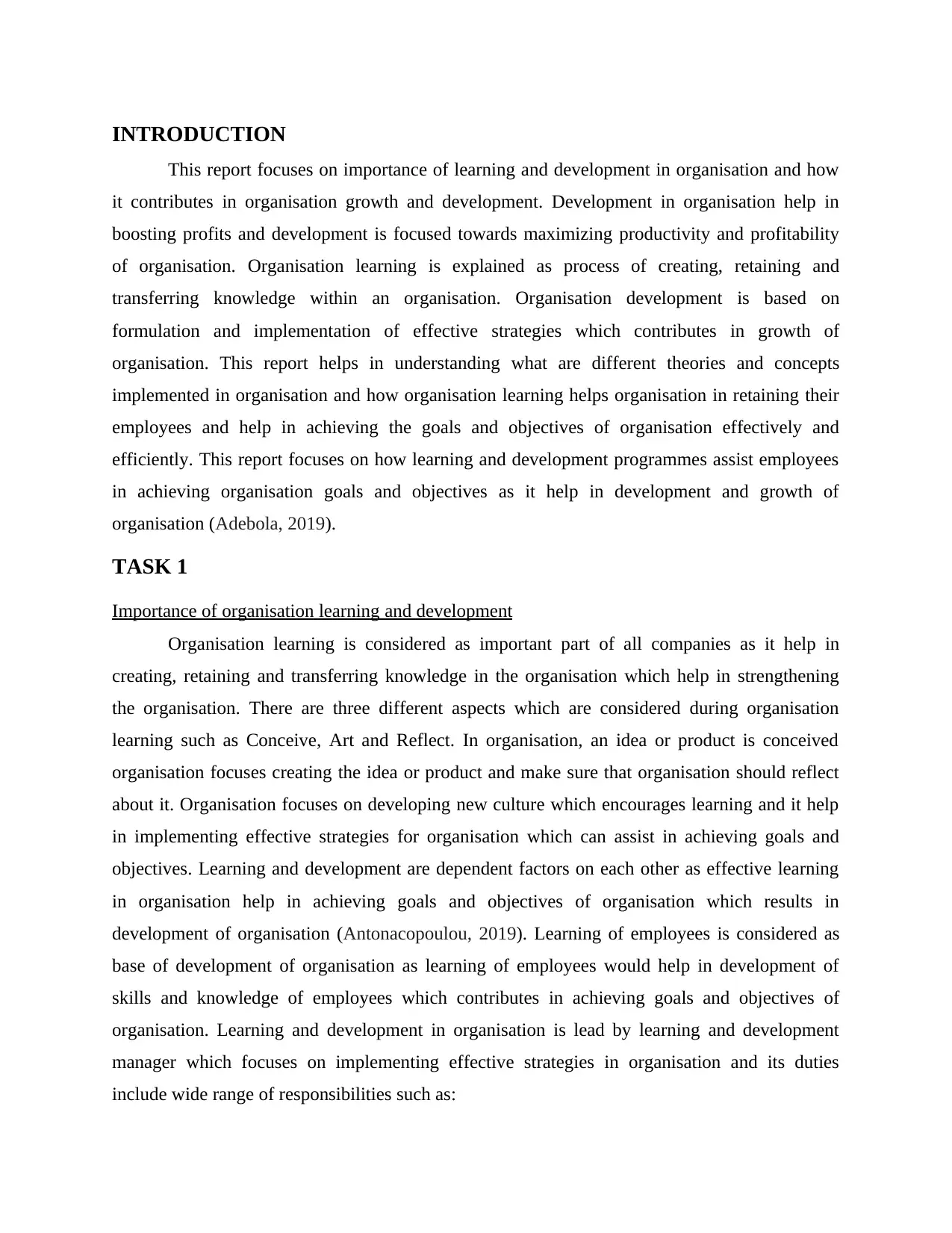
INTRODUCTION
This report focuses on importance of learning and development in organisation and how
it contributes in organisation growth and development. Development in organisation help in
boosting profits and development is focused towards maximizing productivity and profitability
of organisation. Organisation learning is explained as process of creating, retaining and
transferring knowledge within an organisation. Organisation development is based on
formulation and implementation of effective strategies which contributes in growth of
organisation. This report helps in understanding what are different theories and concepts
implemented in organisation and how organisation learning helps organisation in retaining their
employees and help in achieving the goals and objectives of organisation effectively and
efficiently. This report focuses on how learning and development programmes assist employees
in achieving organisation goals and objectives as it help in development and growth of
organisation (Adebola, 2019).
TASK 1
Importance of organisation learning and development
Organisation learning is considered as important part of all companies as it help in
creating, retaining and transferring knowledge in the organisation which help in strengthening
the organisation. There are three different aspects which are considered during organisation
learning such as Conceive, Art and Reflect. In organisation, an idea or product is conceived
organisation focuses creating the idea or product and make sure that organisation should reflect
about it. Organisation focuses on developing new culture which encourages learning and it help
in implementing effective strategies for organisation which can assist in achieving goals and
objectives. Learning and development are dependent factors on each other as effective learning
in organisation help in achieving goals and objectives of organisation which results in
development of organisation (Antonacopoulou, 2019). Learning of employees is considered as
base of development of organisation as learning of employees would help in development of
skills and knowledge of employees which contributes in achieving goals and objectives of
organisation. Learning and development in organisation is lead by learning and development
manager which focuses on implementing effective strategies in organisation and its duties
include wide range of responsibilities such as:
This report focuses on importance of learning and development in organisation and how
it contributes in organisation growth and development. Development in organisation help in
boosting profits and development is focused towards maximizing productivity and profitability
of organisation. Organisation learning is explained as process of creating, retaining and
transferring knowledge within an organisation. Organisation development is based on
formulation and implementation of effective strategies which contributes in growth of
organisation. This report helps in understanding what are different theories and concepts
implemented in organisation and how organisation learning helps organisation in retaining their
employees and help in achieving the goals and objectives of organisation effectively and
efficiently. This report focuses on how learning and development programmes assist employees
in achieving organisation goals and objectives as it help in development and growth of
organisation (Adebola, 2019).
TASK 1
Importance of organisation learning and development
Organisation learning is considered as important part of all companies as it help in
creating, retaining and transferring knowledge in the organisation which help in strengthening
the organisation. There are three different aspects which are considered during organisation
learning such as Conceive, Art and Reflect. In organisation, an idea or product is conceived
organisation focuses creating the idea or product and make sure that organisation should reflect
about it. Organisation focuses on developing new culture which encourages learning and it help
in implementing effective strategies for organisation which can assist in achieving goals and
objectives. Learning and development are dependent factors on each other as effective learning
in organisation help in achieving goals and objectives of organisation which results in
development of organisation (Antonacopoulou, 2019). Learning of employees is considered as
base of development of organisation as learning of employees would help in development of
skills and knowledge of employees which contributes in achieving goals and objectives of
organisation. Learning and development in organisation is lead by learning and development
manager which focuses on implementing effective strategies in organisation and its duties
include wide range of responsibilities such as:
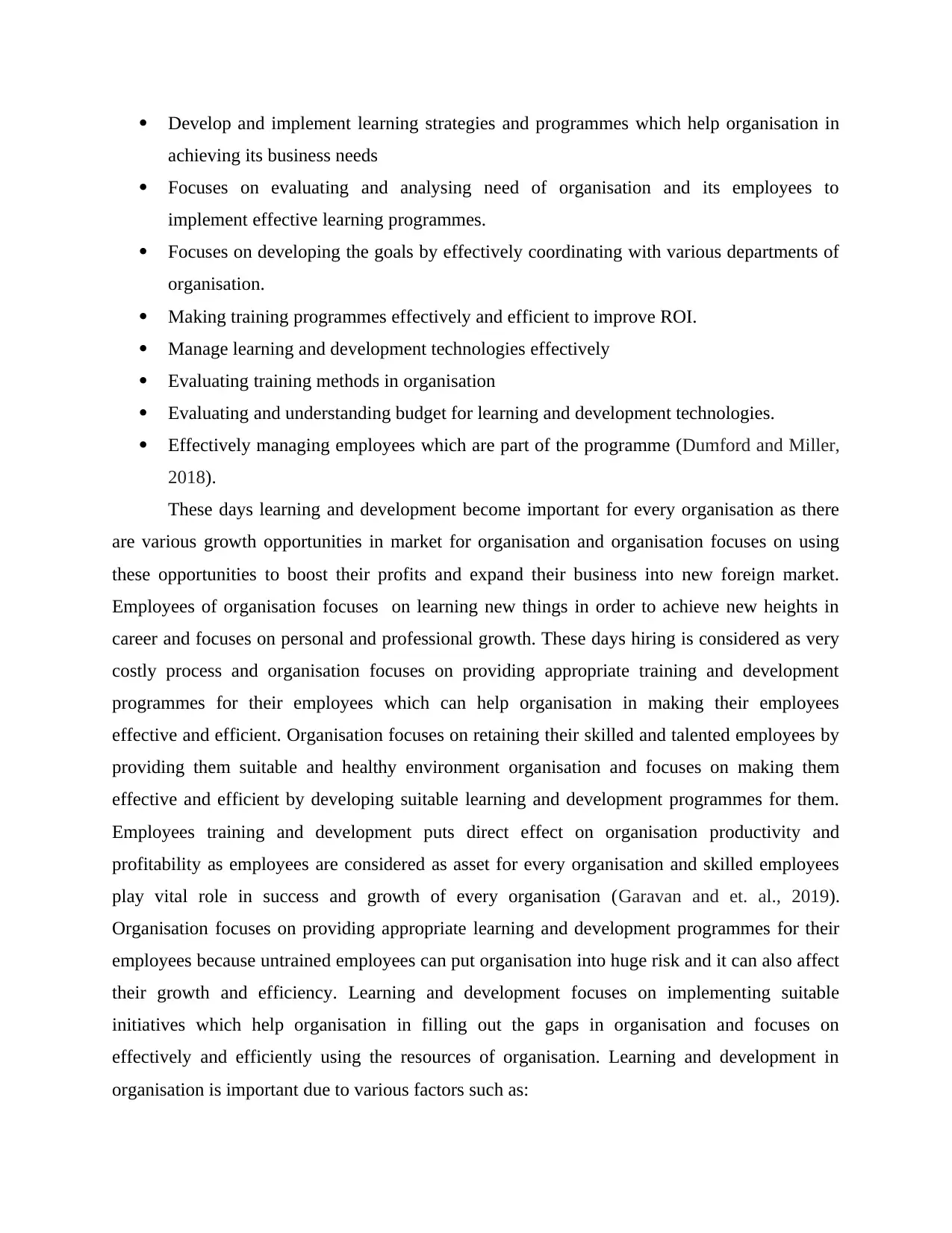
Develop and implement learning strategies and programmes which help organisation in
achieving its business needs
Focuses on evaluating and analysing need of organisation and its employees to
implement effective learning programmes.
Focuses on developing the goals by effectively coordinating with various departments of
organisation.
Making training programmes effectively and efficient to improve ROI.
Manage learning and development technologies effectively
Evaluating training methods in organisation
Evaluating and understanding budget for learning and development technologies.
Effectively managing employees which are part of the programme (Dumford and Miller,
2018).
These days learning and development become important for every organisation as there
are various growth opportunities in market for organisation and organisation focuses on using
these opportunities to boost their profits and expand their business into new foreign market.
Employees of organisation focuses on learning new things in order to achieve new heights in
career and focuses on personal and professional growth. These days hiring is considered as very
costly process and organisation focuses on providing appropriate training and development
programmes for their employees which can help organisation in making their employees
effective and efficient. Organisation focuses on retaining their skilled and talented employees by
providing them suitable and healthy environment organisation and focuses on making them
effective and efficient by developing suitable learning and development programmes for them.
Employees training and development puts direct effect on organisation productivity and
profitability as employees are considered as asset for every organisation and skilled employees
play vital role in success and growth of every organisation (Garavan and et. al., 2019).
Organisation focuses on providing appropriate learning and development programmes for their
employees because untrained employees can put organisation into huge risk and it can also affect
their growth and efficiency. Learning and development focuses on implementing suitable
initiatives which help organisation in filling out the gaps in organisation and focuses on
effectively and efficiently using the resources of organisation. Learning and development in
organisation is important due to various factors such as:
achieving its business needs
Focuses on evaluating and analysing need of organisation and its employees to
implement effective learning programmes.
Focuses on developing the goals by effectively coordinating with various departments of
organisation.
Making training programmes effectively and efficient to improve ROI.
Manage learning and development technologies effectively
Evaluating training methods in organisation
Evaluating and understanding budget for learning and development technologies.
Effectively managing employees which are part of the programme (Dumford and Miller,
2018).
These days learning and development become important for every organisation as there
are various growth opportunities in market for organisation and organisation focuses on using
these opportunities to boost their profits and expand their business into new foreign market.
Employees of organisation focuses on learning new things in order to achieve new heights in
career and focuses on personal and professional growth. These days hiring is considered as very
costly process and organisation focuses on providing appropriate training and development
programmes for their employees which can help organisation in making their employees
effective and efficient. Organisation focuses on retaining their skilled and talented employees by
providing them suitable and healthy environment organisation and focuses on making them
effective and efficient by developing suitable learning and development programmes for them.
Employees training and development puts direct effect on organisation productivity and
profitability as employees are considered as asset for every organisation and skilled employees
play vital role in success and growth of every organisation (Garavan and et. al., 2019).
Organisation focuses on providing appropriate learning and development programmes for their
employees because untrained employees can put organisation into huge risk and it can also affect
their growth and efficiency. Learning and development focuses on implementing suitable
initiatives which help organisation in filling out the gaps in organisation and focuses on
effectively and efficiently using the resources of organisation. Learning and development in
organisation is important due to various factors such as:
Secure Best Marks with AI Grader
Need help grading? Try our AI Grader for instant feedback on your assignments.

It helps in increasing employee satisfaction regarding their job.
Reduces turnover rates
Maximize productivity and profits of organisation.
Enhanced adaptability of organisation.
When organisation focuses on implementing learning and development culture in
organisation it becomes more effectively and efficient also it makes organisation competitive.
Learning and development culture of organisation help in adapting to new market trends
effectively and react quickly towards changing market conditions in current scenario. Learning
and development is considered as wide concept because it includes several theories and concepts
which are utilised by organisation in order to make their employees effective and efficient.
Learning and development goal is to align organisation goals and objectives with employee
performance. Learning and development programmes help in ensuring consistent performance of
employees in organisation and also help in making effective manpower of organisation. It help in
developing appropriate strategies for organisation development which can help organisation in
achieving competitor advantage over their competitors (Limwichitr, Broady-Preston and Ellis,
2018).
Every organisation manager focuses on making workforce of organisation effective and
focuses on providing appropriate training to their employees which is beneficial in development
of organisation employees. Organisation which focuses on making change in organisation
training with time are considered as more effective in current scenario. Organisation productivity
and profitability depends on employees because employees help organisation in achieving
desired goals and objectives which contributes in organisation growth and development.
Organisation which focuses on making their employee skilful are more likely to be effective and
competitive in market and it also help organisation in analysing past outcomes and implementing
new strategies for organisation development (Lizier, 2017).
Learning development theories
As discussed in above part learning and development theories focuses on organisation
development which is based on developing culture of learning and development of employees.
Employees development help in developing their skills and knowledge which help them to
contribute in organisation growth and development for long-term. Learning and development
theories are explained as theories used to understand need of learning and development within
Reduces turnover rates
Maximize productivity and profits of organisation.
Enhanced adaptability of organisation.
When organisation focuses on implementing learning and development culture in
organisation it becomes more effectively and efficient also it makes organisation competitive.
Learning and development culture of organisation help in adapting to new market trends
effectively and react quickly towards changing market conditions in current scenario. Learning
and development is considered as wide concept because it includes several theories and concepts
which are utilised by organisation in order to make their employees effective and efficient.
Learning and development goal is to align organisation goals and objectives with employee
performance. Learning and development programmes help in ensuring consistent performance of
employees in organisation and also help in making effective manpower of organisation. It help in
developing appropriate strategies for organisation development which can help organisation in
achieving competitor advantage over their competitors (Limwichitr, Broady-Preston and Ellis,
2018).
Every organisation manager focuses on making workforce of organisation effective and
focuses on providing appropriate training to their employees which is beneficial in development
of organisation employees. Organisation which focuses on making change in organisation
training with time are considered as more effective in current scenario. Organisation productivity
and profitability depends on employees because employees help organisation in achieving
desired goals and objectives which contributes in organisation growth and development.
Organisation which focuses on making their employee skilful are more likely to be effective and
competitive in market and it also help organisation in analysing past outcomes and implementing
new strategies for organisation development (Lizier, 2017).
Learning development theories
As discussed in above part learning and development theories focuses on organisation
development which is based on developing culture of learning and development of employees.
Employees development help in developing their skills and knowledge which help them to
contribute in organisation growth and development for long-term. Learning and development
theories are explained as theories used to understand need of learning and development within
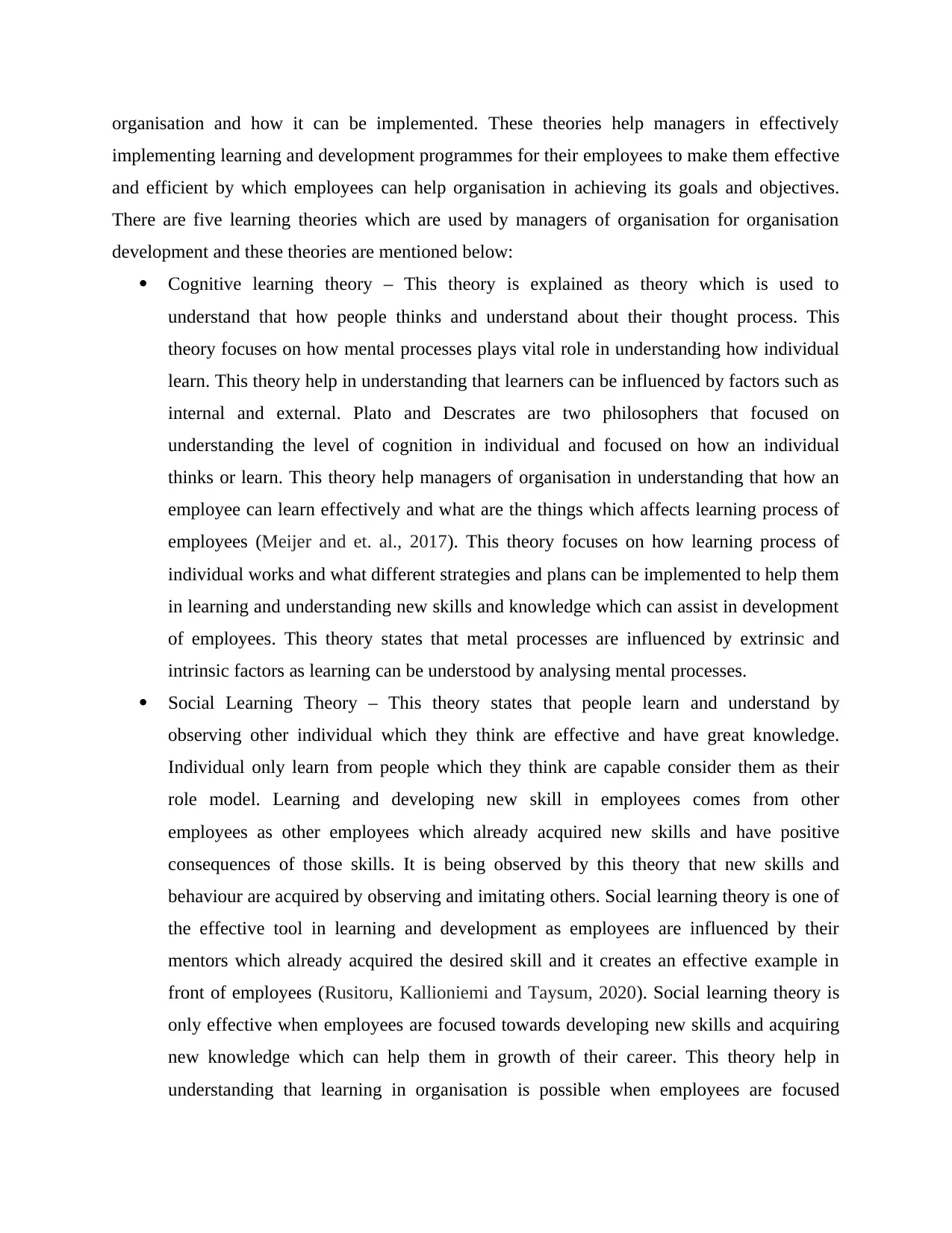
organisation and how it can be implemented. These theories help managers in effectively
implementing learning and development programmes for their employees to make them effective
and efficient by which employees can help organisation in achieving its goals and objectives.
There are five learning theories which are used by managers of organisation for organisation
development and these theories are mentioned below:
Cognitive learning theory – This theory is explained as theory which is used to
understand that how people thinks and understand about their thought process. This
theory focuses on how mental processes plays vital role in understanding how individual
learn. This theory help in understanding that learners can be influenced by factors such as
internal and external. Plato and Descrates are two philosophers that focused on
understanding the level of cognition in individual and focused on how an individual
thinks or learn. This theory help managers of organisation in understanding that how an
employee can learn effectively and what are the things which affects learning process of
employees (Meijer and et. al., 2017). This theory focuses on how learning process of
individual works and what different strategies and plans can be implemented to help them
in learning and understanding new skills and knowledge which can assist in development
of employees. This theory states that metal processes are influenced by extrinsic and
intrinsic factors as learning can be understood by analysing mental processes.
Social Learning Theory – This theory states that people learn and understand by
observing other individual which they think are effective and have great knowledge.
Individual only learn from people which they think are capable consider them as their
role model. Learning and developing new skill in employees comes from other
employees as other employees which already acquired new skills and have positive
consequences of those skills. It is being observed by this theory that new skills and
behaviour are acquired by observing and imitating others. Social learning theory is one of
the effective tool in learning and development as employees are influenced by their
mentors which already acquired the desired skill and it creates an effective example in
front of employees (Rusitoru, Kallioniemi and Taysum, 2020). Social learning theory is
only effective when employees are focused towards developing new skills and acquiring
new knowledge which can help them in growth of their career. This theory help in
understanding that learning in organisation is possible when employees are focused
implementing learning and development programmes for their employees to make them effective
and efficient by which employees can help organisation in achieving its goals and objectives.
There are five learning theories which are used by managers of organisation for organisation
development and these theories are mentioned below:
Cognitive learning theory – This theory is explained as theory which is used to
understand that how people thinks and understand about their thought process. This
theory focuses on how mental processes plays vital role in understanding how individual
learn. This theory help in understanding that learners can be influenced by factors such as
internal and external. Plato and Descrates are two philosophers that focused on
understanding the level of cognition in individual and focused on how an individual
thinks or learn. This theory help managers of organisation in understanding that how an
employee can learn effectively and what are the things which affects learning process of
employees (Meijer and et. al., 2017). This theory focuses on how learning process of
individual works and what different strategies and plans can be implemented to help them
in learning and understanding new skills and knowledge which can assist in development
of employees. This theory states that metal processes are influenced by extrinsic and
intrinsic factors as learning can be understood by analysing mental processes.
Social Learning Theory – This theory states that people learn and understand by
observing other individual which they think are effective and have great knowledge.
Individual only learn from people which they think are capable consider them as their
role model. Learning and developing new skill in employees comes from other
employees as other employees which already acquired new skills and have positive
consequences of those skills. It is being observed by this theory that new skills and
behaviour are acquired by observing and imitating others. Social learning theory is one of
the effective tool in learning and development as employees are influenced by their
mentors which already acquired the desired skill and it creates an effective example in
front of employees (Rusitoru, Kallioniemi and Taysum, 2020). Social learning theory is
only effective when employees are focused towards developing new skills and acquiring
new knowledge which can help them in growth of their career. This theory help in
understanding that learning in organisation is possible when employees are focused
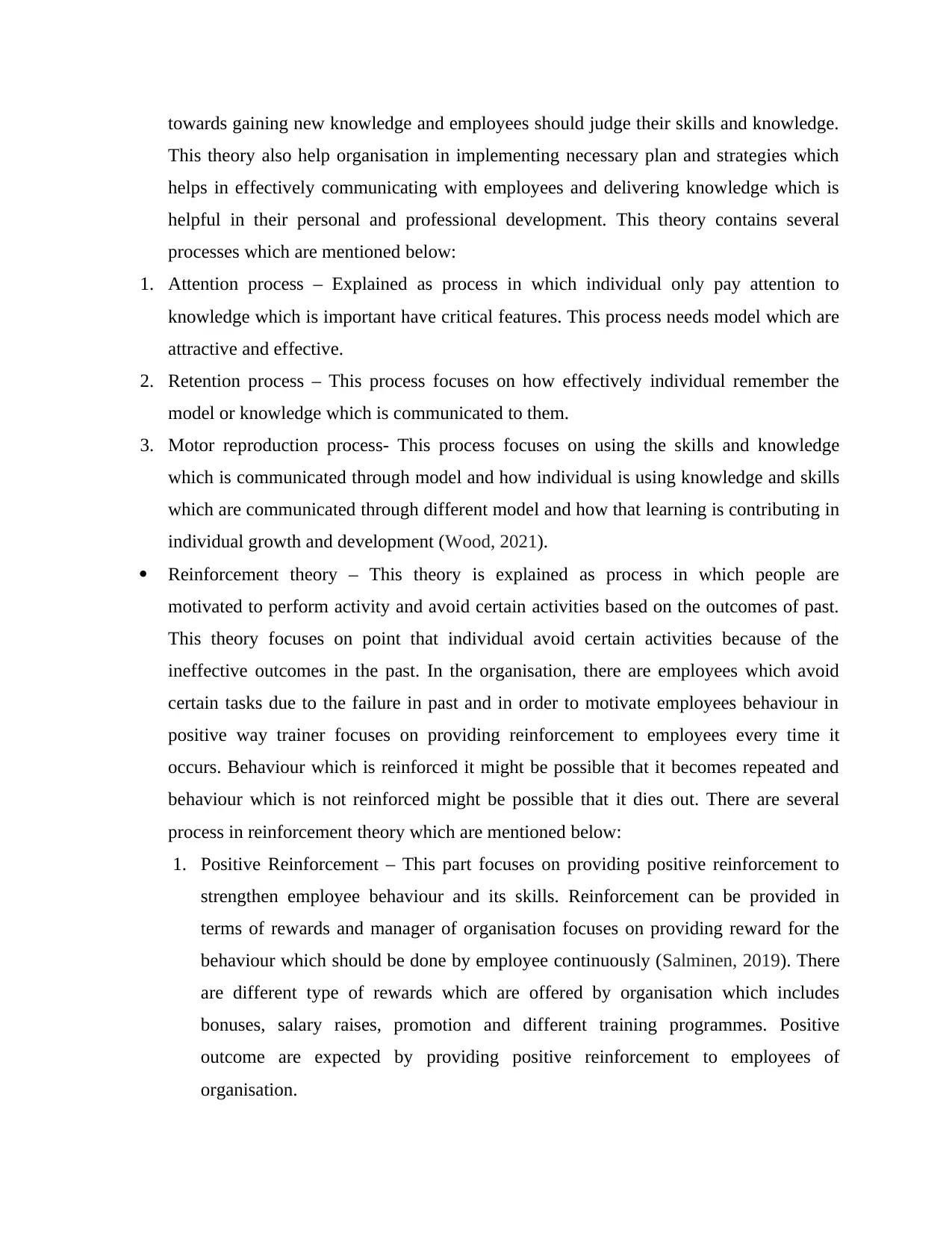
towards gaining new knowledge and employees should judge their skills and knowledge.
This theory also help organisation in implementing necessary plan and strategies which
helps in effectively communicating with employees and delivering knowledge which is
helpful in their personal and professional development. This theory contains several
processes which are mentioned below:
1. Attention process – Explained as process in which individual only pay attention to
knowledge which is important have critical features. This process needs model which are
attractive and effective.
2. Retention process – This process focuses on how effectively individual remember the
model or knowledge which is communicated to them.
3. Motor reproduction process- This process focuses on using the skills and knowledge
which is communicated through model and how individual is using knowledge and skills
which are communicated through different model and how that learning is contributing in
individual growth and development (Wood, 2021).
Reinforcement theory – This theory is explained as process in which people are
motivated to perform activity and avoid certain activities based on the outcomes of past.
This theory focuses on point that individual avoid certain activities because of the
ineffective outcomes in the past. In the organisation, there are employees which avoid
certain tasks due to the failure in past and in order to motivate employees behaviour in
positive way trainer focuses on providing reinforcement to employees every time it
occurs. Behaviour which is reinforced it might be possible that it becomes repeated and
behaviour which is not reinforced might be possible that it dies out. There are several
process in reinforcement theory which are mentioned below:
1. Positive Reinforcement – This part focuses on providing positive reinforcement to
strengthen employee behaviour and its skills. Reinforcement can be provided in
terms of rewards and manager of organisation focuses on providing reward for the
behaviour which should be done by employee continuously (Salminen, 2019). There
are different type of rewards which are offered by organisation which includes
bonuses, salary raises, promotion and different training programmes. Positive
outcome are expected by providing positive reinforcement to employees of
organisation.
This theory also help organisation in implementing necessary plan and strategies which
helps in effectively communicating with employees and delivering knowledge which is
helpful in their personal and professional development. This theory contains several
processes which are mentioned below:
1. Attention process – Explained as process in which individual only pay attention to
knowledge which is important have critical features. This process needs model which are
attractive and effective.
2. Retention process – This process focuses on how effectively individual remember the
model or knowledge which is communicated to them.
3. Motor reproduction process- This process focuses on using the skills and knowledge
which is communicated through model and how individual is using knowledge and skills
which are communicated through different model and how that learning is contributing in
individual growth and development (Wood, 2021).
Reinforcement theory – This theory is explained as process in which people are
motivated to perform activity and avoid certain activities based on the outcomes of past.
This theory focuses on point that individual avoid certain activities because of the
ineffective outcomes in the past. In the organisation, there are employees which avoid
certain tasks due to the failure in past and in order to motivate employees behaviour in
positive way trainer focuses on providing reinforcement to employees every time it
occurs. Behaviour which is reinforced it might be possible that it becomes repeated and
behaviour which is not reinforced might be possible that it dies out. There are several
process in reinforcement theory which are mentioned below:
1. Positive Reinforcement – This part focuses on providing positive reinforcement to
strengthen employee behaviour and its skills. Reinforcement can be provided in
terms of rewards and manager of organisation focuses on providing reward for the
behaviour which should be done by employee continuously (Salminen, 2019). There
are different type of rewards which are offered by organisation which includes
bonuses, salary raises, promotion and different training programmes. Positive
outcome are expected by providing positive reinforcement to employees of
organisation.
Paraphrase This Document
Need a fresh take? Get an instant paraphrase of this document with our AI Paraphraser
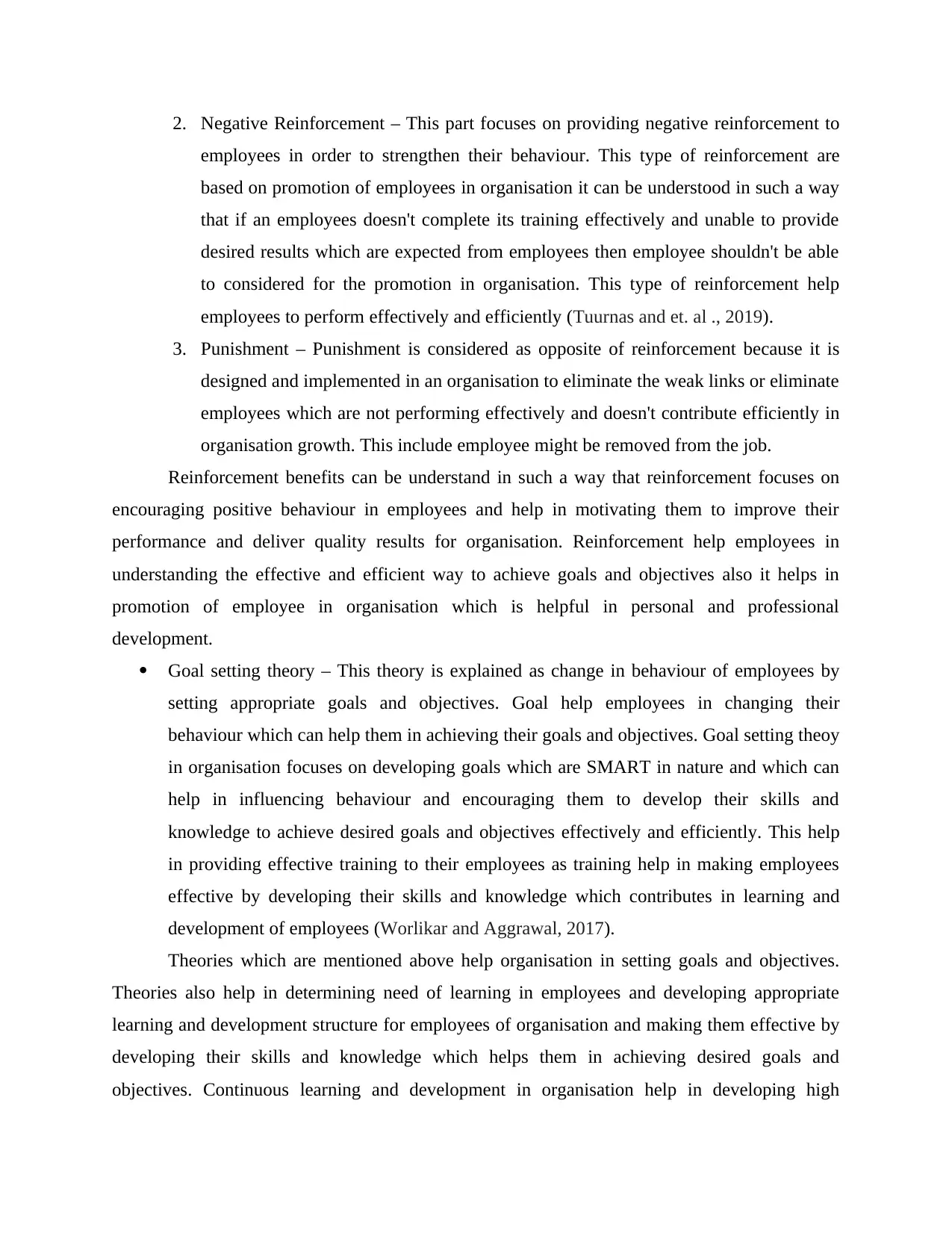
2. Negative Reinforcement – This part focuses on providing negative reinforcement to
employees in order to strengthen their behaviour. This type of reinforcement are
based on promotion of employees in organisation it can be understood in such a way
that if an employees doesn't complete its training effectively and unable to provide
desired results which are expected from employees then employee shouldn't be able
to considered for the promotion in organisation. This type of reinforcement help
employees to perform effectively and efficiently (Tuurnas and et. al ., 2019).
3. Punishment – Punishment is considered as opposite of reinforcement because it is
designed and implemented in an organisation to eliminate the weak links or eliminate
employees which are not performing effectively and doesn't contribute efficiently in
organisation growth. This include employee might be removed from the job.
Reinforcement benefits can be understand in such a way that reinforcement focuses on
encouraging positive behaviour in employees and help in motivating them to improve their
performance and deliver quality results for organisation. Reinforcement help employees in
understanding the effective and efficient way to achieve goals and objectives also it helps in
promotion of employee in organisation which is helpful in personal and professional
development.
Goal setting theory – This theory is explained as change in behaviour of employees by
setting appropriate goals and objectives. Goal help employees in changing their
behaviour which can help them in achieving their goals and objectives. Goal setting theoy
in organisation focuses on developing goals which are SMART in nature and which can
help in influencing behaviour and encouraging them to develop their skills and
knowledge to achieve desired goals and objectives effectively and efficiently. This help
in providing effective training to their employees as training help in making employees
effective by developing their skills and knowledge which contributes in learning and
development of employees (Worlikar and Aggrawal, 2017).
Theories which are mentioned above help organisation in setting goals and objectives.
Theories also help in determining need of learning in employees and developing appropriate
learning and development structure for employees of organisation and making them effective by
developing their skills and knowledge which helps them in achieving desired goals and
objectives. Continuous learning and development in organisation help in developing high
employees in order to strengthen their behaviour. This type of reinforcement are
based on promotion of employees in organisation it can be understood in such a way
that if an employees doesn't complete its training effectively and unable to provide
desired results which are expected from employees then employee shouldn't be able
to considered for the promotion in organisation. This type of reinforcement help
employees to perform effectively and efficiently (Tuurnas and et. al ., 2019).
3. Punishment – Punishment is considered as opposite of reinforcement because it is
designed and implemented in an organisation to eliminate the weak links or eliminate
employees which are not performing effectively and doesn't contribute efficiently in
organisation growth. This include employee might be removed from the job.
Reinforcement benefits can be understand in such a way that reinforcement focuses on
encouraging positive behaviour in employees and help in motivating them to improve their
performance and deliver quality results for organisation. Reinforcement help employees in
understanding the effective and efficient way to achieve goals and objectives also it helps in
promotion of employee in organisation which is helpful in personal and professional
development.
Goal setting theory – This theory is explained as change in behaviour of employees by
setting appropriate goals and objectives. Goal help employees in changing their
behaviour which can help them in achieving their goals and objectives. Goal setting theoy
in organisation focuses on developing goals which are SMART in nature and which can
help in influencing behaviour and encouraging them to develop their skills and
knowledge to achieve desired goals and objectives effectively and efficiently. This help
in providing effective training to their employees as training help in making employees
effective by developing their skills and knowledge which contributes in learning and
development of employees (Worlikar and Aggrawal, 2017).
Theories which are mentioned above help organisation in setting goals and objectives.
Theories also help in determining need of learning in employees and developing appropriate
learning and development structure for employees of organisation and making them effective by
developing their skills and knowledge which helps them in achieving desired goals and
objectives. Continuous learning and development in organisation help in developing high
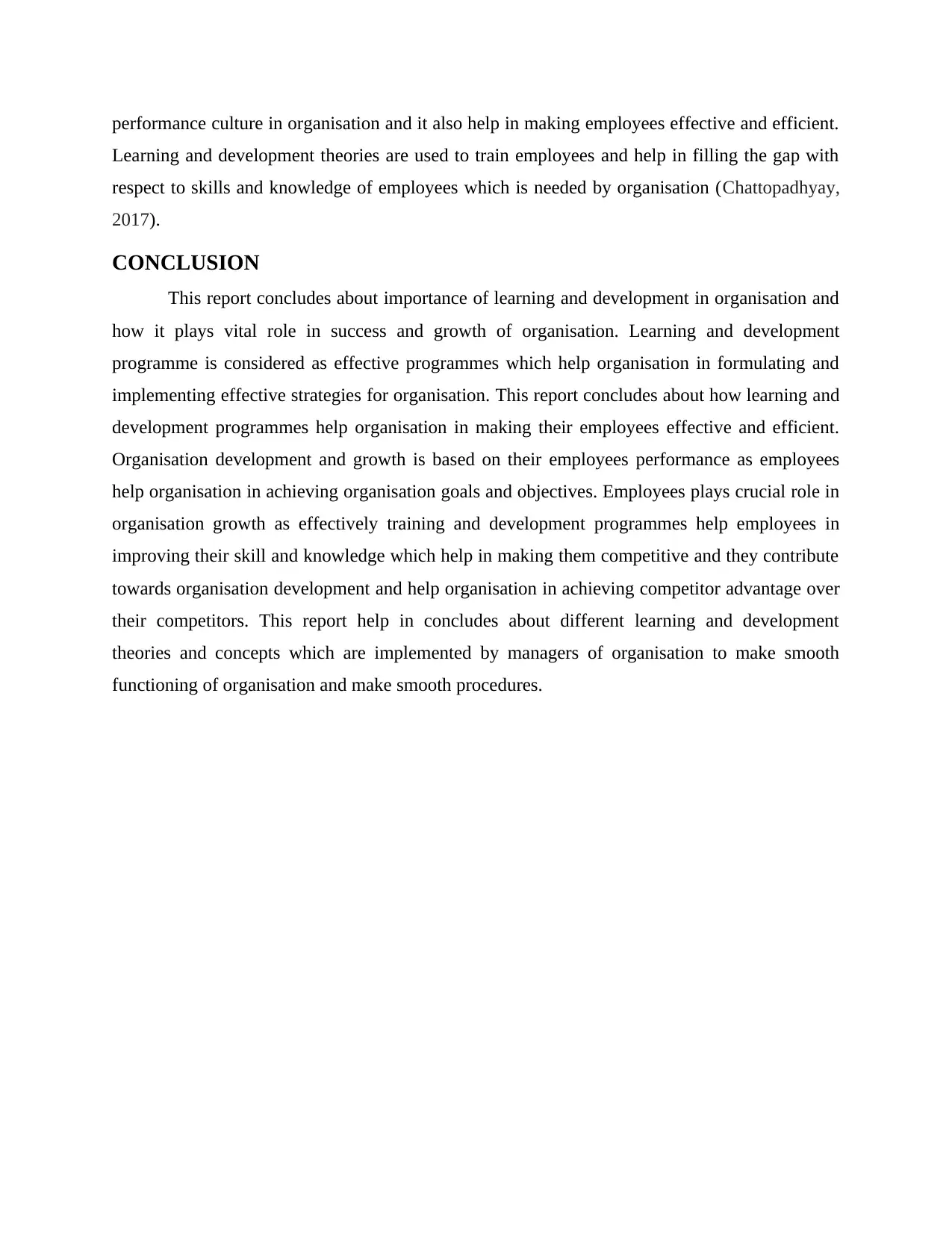
performance culture in organisation and it also help in making employees effective and efficient.
Learning and development theories are used to train employees and help in filling the gap with
respect to skills and knowledge of employees which is needed by organisation (Chattopadhyay,
2017).
CONCLUSION
This report concludes about importance of learning and development in organisation and
how it plays vital role in success and growth of organisation. Learning and development
programme is considered as effective programmes which help organisation in formulating and
implementing effective strategies for organisation. This report concludes about how learning and
development programmes help organisation in making their employees effective and efficient.
Organisation development and growth is based on their employees performance as employees
help organisation in achieving organisation goals and objectives. Employees plays crucial role in
organisation growth as effectively training and development programmes help employees in
improving their skill and knowledge which help in making them competitive and they contribute
towards organisation development and help organisation in achieving competitor advantage over
their competitors. This report help in concludes about different learning and development
theories and concepts which are implemented by managers of organisation to make smooth
functioning of organisation and make smooth procedures.
Learning and development theories are used to train employees and help in filling the gap with
respect to skills and knowledge of employees which is needed by organisation (Chattopadhyay,
2017).
CONCLUSION
This report concludes about importance of learning and development in organisation and
how it plays vital role in success and growth of organisation. Learning and development
programme is considered as effective programmes which help organisation in formulating and
implementing effective strategies for organisation. This report concludes about how learning and
development programmes help organisation in making their employees effective and efficient.
Organisation development and growth is based on their employees performance as employees
help organisation in achieving organisation goals and objectives. Employees plays crucial role in
organisation growth as effectively training and development programmes help employees in
improving their skill and knowledge which help in making them competitive and they contribute
towards organisation development and help organisation in achieving competitor advantage over
their competitors. This report help in concludes about different learning and development
theories and concepts which are implemented by managers of organisation to make smooth
functioning of organisation and make smooth procedures.

Secure Best Marks with AI Grader
Need help grading? Try our AI Grader for instant feedback on your assignments.
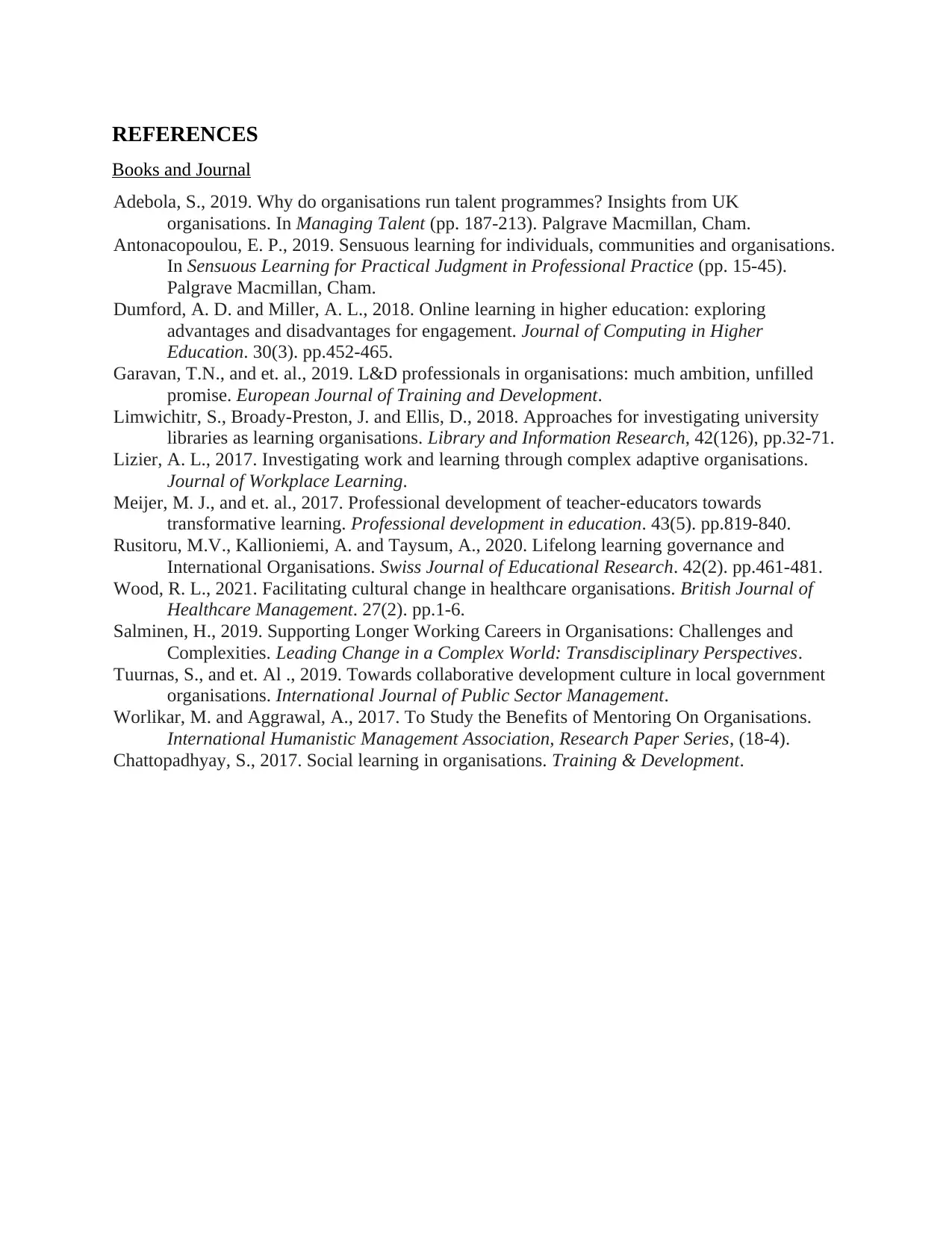
REFERENCES
Books and Journal
Adebola, S., 2019. Why do organisations run talent programmes? Insights from UK
organisations. In Managing Talent (pp. 187-213). Palgrave Macmillan, Cham.
Antonacopoulou, E. P., 2019. Sensuous learning for individuals, communities and organisations.
In Sensuous Learning for Practical Judgment in Professional Practice (pp. 15-45).
Palgrave Macmillan, Cham.
Dumford, A. D. and Miller, A. L., 2018. Online learning in higher education: exploring
advantages and disadvantages for engagement. Journal of Computing in Higher
Education. 30(3). pp.452-465.
Garavan, T.N., and et. al., 2019. L&D professionals in organisations: much ambition, unfilled
promise. European Journal of Training and Development.
Limwichitr, S., Broady-Preston, J. and Ellis, D., 2018. Approaches for investigating university
libraries as learning organisations. Library and Information Research, 42(126), pp.32-71.
Lizier, A. L., 2017. Investigating work and learning through complex adaptive organisations.
Journal of Workplace Learning.
Meijer, M. J., and et. al., 2017. Professional development of teacher-educators towards
transformative learning. Professional development in education. 43(5). pp.819-840.
Rusitoru, M.V., Kallioniemi, A. and Taysum, A., 2020. Lifelong learning governance and
International Organisations. Swiss Journal of Educational Research. 42(2). pp.461-481.
Wood, R. L., 2021. Facilitating cultural change in healthcare organisations. British Journal of
Healthcare Management. 27(2). pp.1-6.
Salminen, H., 2019. Supporting Longer Working Careers in Organisations: Challenges and
Complexities. Leading Change in a Complex World: Transdisciplinary Perspectives.
Tuurnas, S., and et. Al ., 2019. Towards collaborative development culture in local government
organisations. International Journal of Public Sector Management.
Worlikar, M. and Aggrawal, A., 2017. To Study the Benefits of Mentoring On Organisations.
International Humanistic Management Association, Research Paper Series, (18-4).
Chattopadhyay, S., 2017. Social learning in organisations. Training & Development.
Books and Journal
Adebola, S., 2019. Why do organisations run talent programmes? Insights from UK
organisations. In Managing Talent (pp. 187-213). Palgrave Macmillan, Cham.
Antonacopoulou, E. P., 2019. Sensuous learning for individuals, communities and organisations.
In Sensuous Learning for Practical Judgment in Professional Practice (pp. 15-45).
Palgrave Macmillan, Cham.
Dumford, A. D. and Miller, A. L., 2018. Online learning in higher education: exploring
advantages and disadvantages for engagement. Journal of Computing in Higher
Education. 30(3). pp.452-465.
Garavan, T.N., and et. al., 2019. L&D professionals in organisations: much ambition, unfilled
promise. European Journal of Training and Development.
Limwichitr, S., Broady-Preston, J. and Ellis, D., 2018. Approaches for investigating university
libraries as learning organisations. Library and Information Research, 42(126), pp.32-71.
Lizier, A. L., 2017. Investigating work and learning through complex adaptive organisations.
Journal of Workplace Learning.
Meijer, M. J., and et. al., 2017. Professional development of teacher-educators towards
transformative learning. Professional development in education. 43(5). pp.819-840.
Rusitoru, M.V., Kallioniemi, A. and Taysum, A., 2020. Lifelong learning governance and
International Organisations. Swiss Journal of Educational Research. 42(2). pp.461-481.
Wood, R. L., 2021. Facilitating cultural change in healthcare organisations. British Journal of
Healthcare Management. 27(2). pp.1-6.
Salminen, H., 2019. Supporting Longer Working Careers in Organisations: Challenges and
Complexities. Leading Change in a Complex World: Transdisciplinary Perspectives.
Tuurnas, S., and et. Al ., 2019. Towards collaborative development culture in local government
organisations. International Journal of Public Sector Management.
Worlikar, M. and Aggrawal, A., 2017. To Study the Benefits of Mentoring On Organisations.
International Humanistic Management Association, Research Paper Series, (18-4).
Chattopadhyay, S., 2017. Social learning in organisations. Training & Development.
1 out of 11
Your All-in-One AI-Powered Toolkit for Academic Success.
+13062052269
info@desklib.com
Available 24*7 on WhatsApp / Email
![[object Object]](/_next/static/media/star-bottom.7253800d.svg)
Unlock your academic potential
© 2024 | Zucol Services PVT LTD | All rights reserved.



